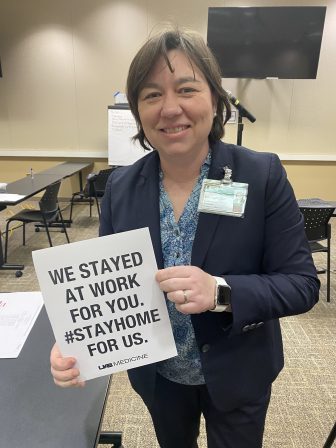Coronavirus Peaks In Alabama On April 20. Here’s What To Expect
Coronavirus is expected to peak Monday in Alabama. That’s according to projections that predict the state will have its highest number of COVID-19 hospitalizations on that day. As of Thursday afternoon, there were 553 hospitalizations related to COVID-19, according to the Alabama Department of Public Health. UAB Hospital has been preparing to ensure it has enough ICU beds and ventilators ahead of Monday’s peak. For more, we checked in for a Q & A with Dr. Sarah Nafziger, an emergency physician and co-director of UAB Hospital’s Emergency Management Committee about how things are looking.
How do things look at this point ahead of the peak?
“There was one point in time where it really looked like our peak might be a lot higher than we now think that it will be. At one point, we thought that we would be in a dire shortage of ICU beds and we spent a good deal of time planning for that. A lot of things have changed since that time, primarily related to social distancing measures that have been implemented in our state. Because of the social distancing measures, we think we’ve been effectively able to flatten the curve, if you will, and reduce the numbers of patients that we’ll see in our near peak that we predict next week. So for us, right now things are looking pretty good. It looks like we are going to have the capacity to take care of what we think will be a peak next week in terms of ICU beds, ventilators, PPE (personal protective equipment), medications. Now, the reason we’re able to accommodate that is that we’ve been very careful in our planning. We’ve been conservative with our PPE usage and we’ve been very intentional with how we utilize our medications, our staffing models and that sort of thing so that we could be prepared for a surge in patient volume. So right now, we’re feeling pretty good about how next week would look.”
What other preparations has UAB made?
“Our team has been working, actually, since the early weeks of January when we first saw the news of this current novel coronavirus, now known as COVID-19. We we began working to conserve PPE, you know, at the same time that we got news of this virus. There were some things on the national market that led to national shortages in PPE, some of it related to coronavirus globally, but some of it related to other supply chain issues. So kind of seeing that come in, we did proactively take measures to conserve PPE here at UAB. And because of that and our early activation of our emergency management team, we feel pretty good that we’re able to get ahead of the planning and really be proactively ready for the patient surge that is to come. Now, we were, you know, for a few weeks really thinking that we’re planning on a surge that was going to be a lot bigger than it looks like we’ll have now. But, you know, like I said, it’s hard to predict the future. But right now, knock on wood, things are looking pretty good.”
Are there other areas where UAB is looking to beef up operations ahead of this projected peak and beyond?
“I’m glad you asked that question, because the question on all of our minds is how do we define what the new normal looks like moving forward after this projected peak next week? Because, as we know, COVID-19 isn’t going to just immediately go away and disappear. This is something that we’re going to have to deal with long term. So a lot of our preparations and work right now is around recovery phase planning and how do we sustain operations and provide that critical health care that people need in a way that’s safe and effective so that we can keep the patients safe and keep our staff safe as well.”
What worries you most in the short term here? What keeps you up at night?
“Well, there are a lot of things keeping me up at night right now, but I think the most common theme for me has been our shortage of PPE because that’s something that we really can’t control. I can’t just go down to the store and buy a whole bunch of PPE right now. In the end, I think that has been the thing that keeps me up the most at night, because not only could that lead to a problem with our patients, but also, you know, I don’t want any of our staff to become infected and ill. And to be honest with you, that’s the thing that keeps me up the most at night, not only worrying about the lives of our patients, but the lives of our employees. I say this a lot. Our staff, our faculty here, they’re the best in the world and they’re our most valuable resource. So I want to protect them and make sure that they’re well taken care of. So that’s the thing that keeps me up at night.”

Of course it’s a massive operation at UAB, but how is the staff doing as far as you can tell?
“You know, I think they’re doing well. I’m not going to sugarcoat it. This has been stressful for the staff. Just that there’s a lot of unknowns. You know, while we’re all worried about our patients and, you know, continuing to do our jobs and make sure that we do that safely, we still all have families at home. We all, you know, are worried about getting our toilet paper and getting our groceries and all the things that everybody else is worried about as well. So we’ve had a lot on our minds. But I have to say, I’m as always, I’m just astonished at how amazing and resilient our staff is. They continue to come to work. They come up with great ideas to help solve some these problems that we’ve never faced before. And they’ve just been amazing. So it’s a pleasure to work with this group of people.”
You mentioned we’ve flattened the curve, coronavirus won’t disappear overnight. What do you envision things looking like after the peak? How quickly can we expect things to improve?
“Think back to post post Hurricane Katrina, after all the big disasters that we face domestically as a country. When things kind of go back to normal, it’s a new normal. It doesn’t look the same as it did before. We we learn new things to do to operate better and more efficiently and more safely. And we implement those changes and a lot of those things we end up holding onto for long-term purposes. So I think after our peak next week, COVID-19 is not going to just go away. We’re going to continue to see cases. We’re going to probably see what I refer to as micro surges or hot spots of cases that outbreak in different areas. And we’re going to have to be ready to respond to that. So kind of what we’re thinking from a recovery operational model, if you will, is we’re going to take a lot of the the components of our incident management team that we’ve implemented to operate during this crisis time and kind of turn on that and pivot that towards more long-term operations and take the things we’ve done effectively and utilize those for a more long-term sustained response. So some examples of that are having some electronics-facilitated daily operational huddles where we talk about ‘these are the challenges that we’re going to have today and these are the things that we need to work together quickly to mitigate these problems. And these are areas where we might have an outbreak of disease that we need to address quickly.’ So those are the kind of things that we think we’ll do long term so that we can get back to a point where we can provide more, you know, essential services and elective services moving forward.”
Anything you’d like to add?
“The only thing I would add is I think that the measure of success for me right now and for our hospital is in something that didn’t happen. And that is that we don’t have a lot of patients who we’re not able to care for because we’re overrun. We we don’t have that situation today that we were worried about a few weeks ago, like in New York. And so that measure of success is wonderful for me. But I think we have to you know, a lot of people might question, was this a false alarm? And I can assure you that it was not. And the only reason that we have the measure of success that we have is because the community has done what we’ve asked. We asked them to stay at home. We asked them to social distance. We asked them to wash their hands. And they’ve done it. And, you know, I have to say, I’m not surprised. I figured that in our local area, that’s what would happen. We’re going to have to continue to be careful. We’re going to have to have sanitation, you know, washing our hands, keeping our distance from people. That’s going to have to continue or we’re going to be right back to where we started and worried about that massive surge that overwhelms all the hospitals capacities.”
Parents, are you sure your kid’s car seat is installed right? Here’s how to know
In this visual guide, certified car seat experts walk through common installation mistakes and how to fix them. Learn what a secure car seat base and a tightly fastened tether look like and more.
Trump announces ‘major combat operations’ in Iran
Israel and the U.S. have launched strikes against Iran, with explosions reported in Tehran and air raid sirens sounding across Israel.
Trump says he is ‘not happy’ with the Iran nuclear talks but indicates he’ll give them more time
U.S. President Donald Trump said Friday he's "not happy" with the latest talks over Iran's nuclear program but indicated he would give negotiators more time to reach a deal to avert another war in the Middle East.
Bill Clinton says he ‘did nothing wrong’ with Epstein as he faced grilling over their relationship
Former President Bill Clinton told members of Congress on Friday that he "did nothing wrong" in his relationship with Jeffrey Epstein and saw no signs of Epstein's sexual abuse as he faced hours of grilling from lawmakers over his connections to the disgraced financier from more than two decades ago.
How the federal government is painting immigrants as criminals on social media
Experts say this kind of media campaign is unprecedented and paints a distorted picture of immigrants and crime
Pentagon puts Scouts ‘on notice’ over DEI and girl-centered policies
After threatening to sever ties with the organization formerly known as the Boy Scouts, Defense Secretary Hegseth announced a 6-month reprieve







